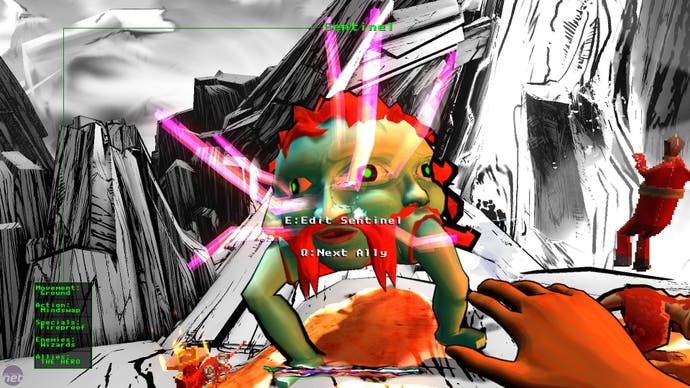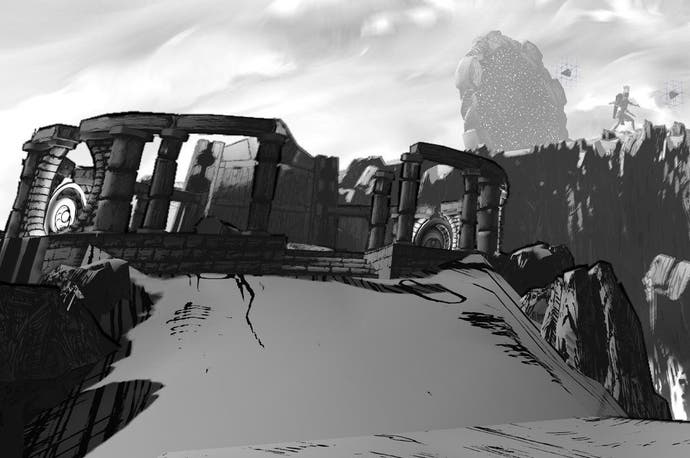The Magic Circle review
Will the circle be unbroken?
Pity the QA testers who worked on The Magic Circle, a game in which you assume the role of an intern tester, trying to break a broken game that's still many moons from release. If the experience didn't trigger something of an existential crisis for them, it surely provided a lasting headache. As you roam its scratchy environments you find that assets and animations are missing, quests are unfinished, and many of the enemies you encounter are rendered in placeholder art. It can't have been easy for the game's real testers to differentiate glitch-by-design from glitch-by-error.
They would, however, have drawn some comfort from their portrayal in the game. In The Magic Circle, the playtester is depicted as the noble and courageous foot soldier in the bloody battle that is contemporary game development: hard-working, intrepid, indispensable. The generals, however - those project leads, art directors and producers - don't come off so lightly. The snarky development notes left around the game environment in which, for example, a game designer points out to an artist that players never look up (so any effort spent rendering exquisite ceilings is time wasted) ring uncomfortably true. And Ishmael Gilder, the game's grandstanding director, is closer to an employment tribunal than a release date for his troubled folly. He treats his staff with appalling contempt. You need only look at their Twitter accounts to see how bad thing have become.

The Magic Circle is a trip to development hell, then. You enter an unfinished game whose development team have run out of both money and, seemingly, resolve. It's a game about game development, but not in the style of Game Dev Story, for example, which is a more straightforward examination of the business. This is, by contrast, a kind of live autopsy on a game project that's gone bad. Ten years in the making, and built upon the shifting sands of PC technology, it's become a tonal mess: what started out as a science fiction game, set in an abandoned space station, has morphed into a fantasy adventure, complete with wizards, zombies, rats and robots. Likewise, what starts out as a straightforward QA job, in which you must hunt game bugs, soon becomes more of an archaeological endeavour, as you try to understand the game's gestation, and diagnose where things went wrong.
The game's mechanical conceit - and it's a good one - is the ability to re-code the behaviour of any creature (and some objects) that you encounter. You might, for example, trap a hostile zombie and re-programme its AI to view you as a friend rather than an enemy. You can then teach it to view other specific creatures as its foes. You can specify how the zombie travels (ground or air) and even remove all of its physical abilities, so it simply lies on the ground in a listless heap, unable to move or attack. All of this is achieved, not by programming proper, but by simply changing parameters in a drop-down menu list of attributes. You can strip-mine attributes, and apply them to different objects to make, for example, a fireproof rat or a hovering rock. Or you can simply turn every enemy you meet into a member of your entourage, trailing behind you, covering your back.
Your own character cannot use these abilities, so much of the game's puzzle design involves reprogramming creatures and objects to help you pass obstacles such as missing platforms or towers of fire. Most video games give the player unimaginable power, but it's always subordinate to that of the designer, who sits, like a creator god, outside of the game's reality, stage-managing the show. The Magic Circle redefines the relationship somewhat, by offering you an approximation of the coder's power, able to redefine the world and its contents to suit your need or whim.

You can never quite lose yourself to the tinkering, however. From the game's opening moments you must listen to the developers, represented as floating eyeballs, as they quarrel overhead about whether or not the player should always wield a sword, or what colour the sky should be painted. Their bickering presence and the strained, if well delivered, dialogue lends a sharp edge to the game's tone. (They're even referred to as 'sky bastards'.) The script is filled with caustic jokes about crowd funding, design clichés, the entitlement of game fans and the creative and organisational frustrations of working for a large studio. In this era of Kickstarter projects, and games that never emerge from development hell, most players will be able to engage with the subject matter in some way. But it is, unavoidably, inside baseball stuff.
The Magic Circle has clearly been something of a therapeutic endeavour for its real world creators, who previously worked on blockbuster titles such as BioShock and Dishonored. The story may be exaggerated, but this is a game in which the tang of bitter experience lingers. It feels truthful, then. But it also feels particular. Most of us sympathise with the fraught experience of working for an unreasonable boss, or of working on a wayward project that's being led by people with competing and conflicting visions. But the targets of The Magic Circle's ire and satire are often too specific to be universal. This is a game written for people who have worked in a particular kind of game development. It's hard to applaud the jokes when it's unclear where the lines between reality and exaggeration lie - and this is a story whose shoots grow from lived experience. Far easier to applaud the game's core gameplay invention, which enlivens The Magic Circle at its heart, and a piece of design that, unlike Ishmael Gilder, will surely find a life beyond its game.









